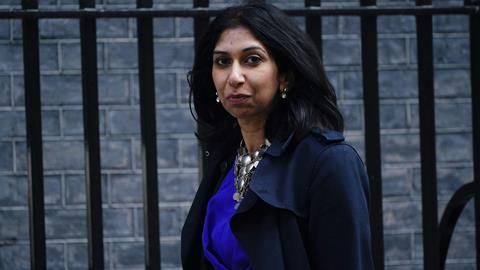The attorney general has been accused of mounting ‘a general attack upon the use of juries’ as she asked the Court of Appeal to give guidance following the acquittal of the so-called Colston Four.
Four people were charged with criminal damage after the statue of slave trader Edward Colston in Bristol was pulled down in 2020. They were all found not guilty by a jury in January, after which Suella Braverman referred the case to the Court of Appeal.
The verdicts cannot be reversed, but the attorney general has asked the court to rule that the question of whether convicting a defendant of criminal damage is a disproportionate interference with their human rights should not be left to a jury.
‘No balancing exercise is appropriate,’ Tom Little QC told the court today. ‘Damage to property is – like violence to the person – a simply unacceptable way to engage in political debate.’
He said that ‘the protection of property rights … is in the pursuit of a legitimate aim’ in relation to Articles 9, 10 and 11 of the European Convention on Human Rights. ‘Acts of criminal damage, whether it be that statue, whether it be other statues in many other towns or cities around the country, [they] cannot be pulled down and damaged in the way that this was in pursuit of or pursuant to the rights under Articles 9, 10 and 11,’ Little added.
He also said in written submissions: ‘Criminal damage is within the category of offences where any proportionality balance which may arise is struck by the terms of the offence-creating provision, without more ado.’
But lawyers for one of the Colston Four said the attorney general’s argument ‘extinguishes the role of the courts to review the convention compatibility of a criminal conviction that restricts expression in individual cases once the offence has been deemed to be intrinsically proportionate’.
Clare Montgomery QC argued in written submissions: ‘This is, at its core, fundamentally at odds with the constitutional shift brought about by the [Human Rights Act 1998] in the protection of rights of expression and assembly.’
She also said that juries – ‘by far the most reliable arbiter of society’s views on fairness and balance’ – are capable of making value judgments, giving the example of where they must decide whether a defendant has used reasonable force. ‘The fact that the jury may have to weigh competing values does not present particular difficulty,’ Montgomery said. ‘Juries are often asked to make judgments about balance in relation to moral as well as legal issues. Decisions about dishonesty, abuse of position, indecency, as well as reasonable excuse often involve difficult questions of judgment.’
She added: ‘The suggested difficulty of inconsistent or unreasoned decision making is no more than a general attack upon the use of juries rather than a reasoned basis for denying a jury trial to direct action protesters.’
Human rights group Liberty, which has intervened in the case, said that ‘it is incumbent on the court, as a public authority, to justify an interference with the right to protest’.
Jude Bunting QC argued: ‘The wider concerns expressed by the attorney general (about the potential for inconsistency, the lack of reasons given for jury verdicts, the difficulty for a defendant to challenge a jury verdict on irrationality grounds) are really concerns about the jury system as a whole. Those concerns are over-stated. The constitutional importance of the jury in finding facts ought not be under-stated.’
The hearing continues.
In a statement, the attorney general said: ‘Trial by jury is an important guardian of liberty and critical to that is the legal directions given to the jury. It is in the public interest to clarify the points of law raised in these cases for the future. This is a legal matter which is separate from the politics of the case involved.’



























